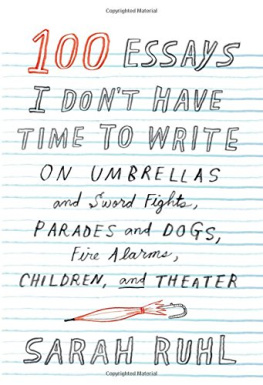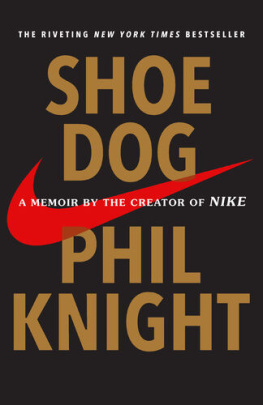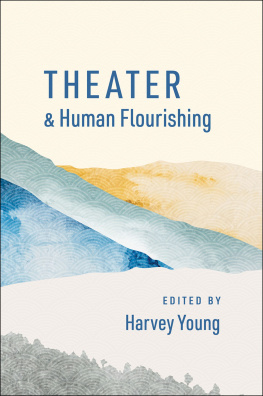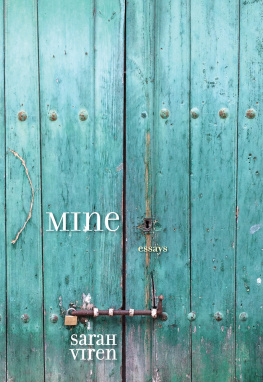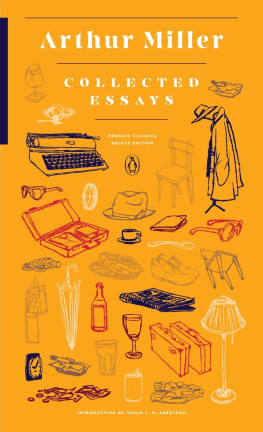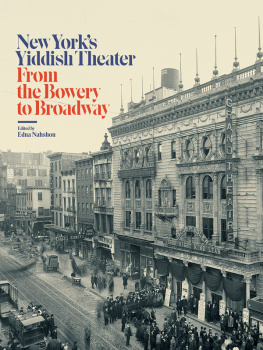A Note About the Author

Sarah Ruhls plays include In the Next Room, or the vibrator play (Pulitzer Prize finalist; Tony Award nominee for best new play); The Clean House (Pulitzer Prize finalist, 2005; winner of the Susan Smith Blackburn Prize); Passion Play: a cycle (PEN American Award); Dead Mans Cell Phone (Helen Hayes Award); and, most recently, Stage Kiss and Dear Elizabeth .
Her many plays have been produced on Broadway, off-Broadway, regionally throughout the country, and internationally. They have been translated into more than fifteen languages, including Polish, Russian, Korean, and Arabic.
Originally from Chicago, Ruhl received her M.F.A. from Brown University, where she studied with Paula Vogel. Ruhl has since been the recipient of a MacArthur Fellowship, the Helen Merrill Emerging Playwright Award, the Whiting Writers Award, the PEN/Laura Pels International Foundation for Theater Award for a mid-career playwright, a Feminist Presss Forty Under Forty Award, and the 2010 Lilly Award. She is currently on the faculty of the Yale School of Drama and lives in Brooklyn with her family.
Acknowledgments
Many thanks to some early readers of these essays: Kathy Ruhl, John Lahr, Todd London, Bruce Ostler, Lydia Weaver, Julia Cho, and, always, Paula Vogel. To some later readers of the essays: Nicholas Dawidoff, Mark Epstein, Quill Camp, Max Ritvo, Katherine Schultz, Sarah Fulford, Edward Carey, Sherry Mason, Andr Bishop, and Anne Cattaneo. To Terry Nolan, who thought there was enough here to make a book, I am eternally grateful. To some early audiences of these essays when I read bits of them out loud at Vassar, Franklin & Marshall, University of Scranton, Washington University, University of Colorado, and the Michener Center. To the collaborators who made their way into these essays: Les Waters, Anne Bogart, Mark Wing-Davey, John Doyle, Davis McCallum, Jessica Thebus, Michael Cerveris, Laura Benanti, Maria Dizzia, and Roy Harris. For Martha Karess, who supported me so wonderfully during bed rest. And I am very grateful to Jonathan Galassi; to Mitzi Angel, a brilliant and passionate minimalist; and to Will Wolfslau.
Also, thanks to Tina Howe, who has given me courage in life and art many times over. Tina gave me my first good-luck charm for an opening night when I was twenty-six. When I first had the twins, she visited me and took me out of the house and said, Sarah, soon they will be in school! I still hear an alarm bell every day at 3:00 p.m., and I stop writing then! But 9:00 a.m. to 3:00 p.m. are perfect hours for a writer! And until they are in school, enjoy rolling around the floor with them! It all goes very fast. And my friend Kathleen Tolan, a brilliant playwright and mother of two, was one of the first people I called when I learned that I was pregnant with twins. I burst into tears on the phone with her, and she said, Dont worry! Big families are wonderful! And I will help you! And so she did.
Perhaps it would hearten me to name some of the playwright mothers who give me inspiration: Julia Cho, Diana Son, Lynn Nottage, Rinne Groff, Theresa Rebeck, Julia Jordan, Jenny Schwartz, Tanya Barfield, Marsha Norman, Amy Herzog, Beth Henley, Kate Marks, Karen Hartman, Bridget Carpenter, Elizabeth Egloff, Quiara Hudes, Suzan-Lori Parks, Caryl Churchill, Adrienne Kennedy, and Karen Zacaras.
To my children, Anna, William, and Hope, who make brief appearances in these essays. And to my husband, always, for making the writing life along with family life possible, and good. To a big-tent circus love.
Also by Sarah Ruhl
Plays
Passion Play: a cycle
The Clean House and Other Plays
Melancholy Play
Late: a cowboy song
Eurydice
Dead Mans Cell Phone
In the Next Room, or the vibrator play
Orlando
Stage Kiss
Dear Elizabeth: A Play in Letters from Elizabeth Bishop to Robert Lowell and Back Again
1. On interruptions
I remember reading Alice Walkers essay in my twenties about how a woman writer could manage to have one child, but more was difficult. At the time, I pledged to have no more than one, or at the very most two. (I now have three.) I also remember, before having children, reading Tillie Olsen, who described with such clarity: thinking and ironing and thinking and ironing and writing while ironing and having many childrenshe herself had four. I myself do not iron. My clothes and the clothes of my children are rumpled. The childs need, so pressing, so consuming, for the mother to be there , to be present, and the pressing need of the writer to be half-there, to be there but thinking of other things, caught me
Sorry. In the act of writing that sentence, my son, William, who is now two, came running into my office crying and asking for a fake knife to cut his fake fruit. So there is also, in observing children much of the day and making theater much of the night, this preoccupation with the real and the illusory, and the pleasures and pains of both.
In any case, please forgive the shortness of these essays; do imagine the silences that came betweenthe bodily fluids, the tears, the various shades of
In the middle of that sentence my son came in and sat at my elbow and said tenderly, Mom, can I poop here? I think of Virginia Woolfs A Room of Ones Own and how it needs a practical addendum about locks and bolts and soundproofing.
But I digress. I could lie to you and say that I intended to write something totalizing, something grand. But I confess that I had a more humble ambitionto preserve for myself, in rare private moments, some liberty of thought. Perhaps that is equally 7.
My son just typed 7 on my computer.
There was a time, when I first found out I was pregnant with twins, that I saw only a state of conflict. When I looked at theater and parenthood, I saw only war, competing loyalties, and I thought my writing life was over. There were times when it felt as though my children were annihilating me (truly you have not lived until you have changed one babys diaper while another baby quietly vomits on your shin), and finally I came to the thought, All right, then, annihilate me; that other self was a fiction anyhow. And then I could breathe. I could investigate the pauses.
I found that life intruding on writing was, in fact, life. And that, tempting as it may be for a writer who is also a parent, one must not think of life as an intrusion. At the end of the day, writing has very little to do with writing, and much to do with life. And life, by definition, is not an intrusion.
10. People in plays
The first choice any playwright must make is whether to people the play with people, as opposed to puppets, gods, voices, or inanimate objectsteacups, eggs, spoons. Mostly, this all-important choice goes unremarked upon, as it is by and large assumed that plays will have people. I suppose the choice goes unwrestled with because actors will be in our plays and we assume that actors would prefer to play people rather than stones or snails. But this is not always the case.
The finest actors, those actors with a true calling and a humble nature, might prefer to play stones or snails, or at least be willing. But it is true that some very fine actors do prefer to be people (rather than trees or gods or seagulls), and it is also true that many playwrights live to please actors (actors are so beautiful and have such disarmingly lovely voices, and wed always hoped to be them, and if not to be them, then to love them from a short distance in the dark). So we want to please them, and we hope to give them the gift of people, if it is people that they want.
When I hear complaints about this writer or that writer becoming less avant-garde and more commercial, I often think that such writers actually have no active interest in the marketplace, but they do, after a time, want to please the very fine actors they work with, and they increasingly try to give such actors satisfying roles, which influences the writers aesthetic over time, like the steady lapping of water over a rock.
Next page
